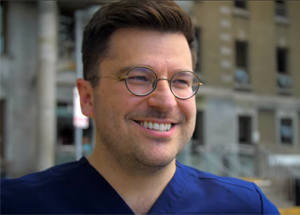 It is difficult to really pinpoint what exactly is the role of a family physician. No other specialty is as varied. In my first year of medicine I never truly had a good grasp of what the role of the family physician is. I admit sharing the same perspective as the layman and have yet to fit family physicians in a single mold. With a bit of time and little experience, I was taken aback to see just how varied the family medicine practice is.
It is difficult to really pinpoint what exactly is the role of a family physician. No other specialty is as varied. In my first year of medicine I never truly had a good grasp of what the role of the family physician is. I admit sharing the same perspective as the layman and have yet to fit family physicians in a single mold. With a bit of time and little experience, I was taken aback to see just how varied the family medicine practice is.
We can spot family doctors just about anywhere. From palliative care to dialysis, family medicine is a compilation of all the major fields. Despite my slightly wiser perspective after a round of “ I spy a family doctor”, I was still surprised to find out that family physicians can be found even in the most acute settings, that of an intensive care unit (ICU). Of course it might not be uncommon to find family physicians working on the wards or in the ICU in more rural settings and community hospitals. However, it is less common to find general practitioners (GPs) thrive in a teaching hospital.
Practicing Family Medicine in Various Settings
It was during an elective rotation where I met Dr. Eric Tremblay, a family physician who has been a staff of the ICU at St. Mary’s Hospital for 21 years. He had initially started his career working on wards and assuring follow-up for those who did not have family physicians. He now maintains an office practice with regular patient follow-ups, ensuring continuity of care. Dr. Eric Tremblay has also done home visits and palliative care before working in the ICU. He is also involved in the international medical graduate (IMG) program and has been responsible for training foreign-certified physicians getting accreditation. I am confident that these were just a few mentions of his vast and over expanding career.
A quick chuckle after I asked why family medicine, Dr. Tremblay stated that it was the variability and flexibility that comes with being a GP. It is no secret that compared to other specialties, family physicians have the ease of diving into different fields of medicine with less restrictions. As per Dr. Tremblay, the importance of having a varied practice in family medicine forces you to articulate your thoughts to patients. Patients expect explanations regarding their diagnosis or treatment. Having a well-rounded grasp on the different medical disciplines allows you to confidently and simply break things down for patients. As famously quoted, variety is the spice of life that gives it its flavour!
Collaboration: A Key to Success in Practice
For budding or aspiring future family physicians, the key is to work in collaboration. In his first few years of practice, Dr. Tremblay worked with a collaborative model where both intensive care physicians and GPs shared the workload. It was an “on the field” training in acute care settings. As for family physicians, they have a shorter residency training, therefore working in collaboration is a great asset to continue to grow as a staff in more specialized fields. Also, the availability of Enhanced Skills Programs offered, such as emergency or sports medicine, can be an initial step. However, maintaining an ever-growing network with academic centres or being a part of family medicine groups (FMG) is just as essential for practice.
The obvious being stated, it is no secret that family medicine is the most wide-ranging career in the medical fields. It might seem daunting when considering all the options available for GPs. From delivering newborns to working in a “pinging” ICU, they do it all! As a GP, integrating an open mind for diversity as well as a collaborative approach should be a quintessential part of practice.
 Kamy Apkarian
Kamy Apkarian
McGill University
Première Ligne would like to thank Dr. Eric Tremblay for his collaboration.










